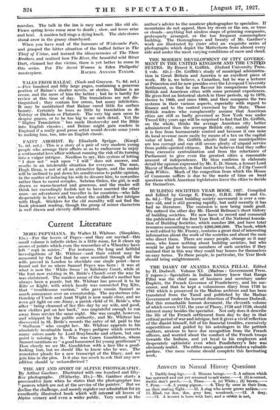THE MODERN DEVELOPMENT OF CITY GOVERN- MENT IN THE UNITED
KINGDOM AND THE UMW) STATES. By Ernest S. Griffith. (Oxford University Press.
2 vols. 42s.)—Dr. Griffith's study of municipal administra- tion in Great Britain and America is an excellent piece of work. He is, we believe, a Canadian, but he was a lecturer at Princeton and he now presides over the Liverpool University Settlement, so that he can flavour his comparisons between British and American cities with some personal experiences. He gives first an historical sketch in three periods, up to 1870, thence to 1900, and since 1900, and then compares the two systems in their various aspects, especially with regard to finance and to the control exercised by the State. Those British readers who complacently assume that American cities are still as badly governed as New York was under Tweed fifty years ago will be surprised to find that Dr. Griffith, on the whole, thinks the average American city better administered than the average British city, mainly because it is free from bureaucratic control and because it can raise its local revenue more easily by means of a tax on the capital value of land. Dr. Griffith admits that our municipalities are less corrupt and can still secure plenty of unpaid service from public-spirited citizens. But he believes that they suffer from excessive centralization and from the reluctance of Parliament to give even the greatest cities a reasonable amount of independence. He thus confirms in elaborate detail the opinion expressed by Mr. E. D. Simon, a former Lord Mayor of Manchester, in that instructive book, A City Council from Within. Much of the congestion from which the House -of Commons suffers is due to the waste of time on local questions which American legislatures leave the cities to decide for themselves.


































 Previous page
Previous page